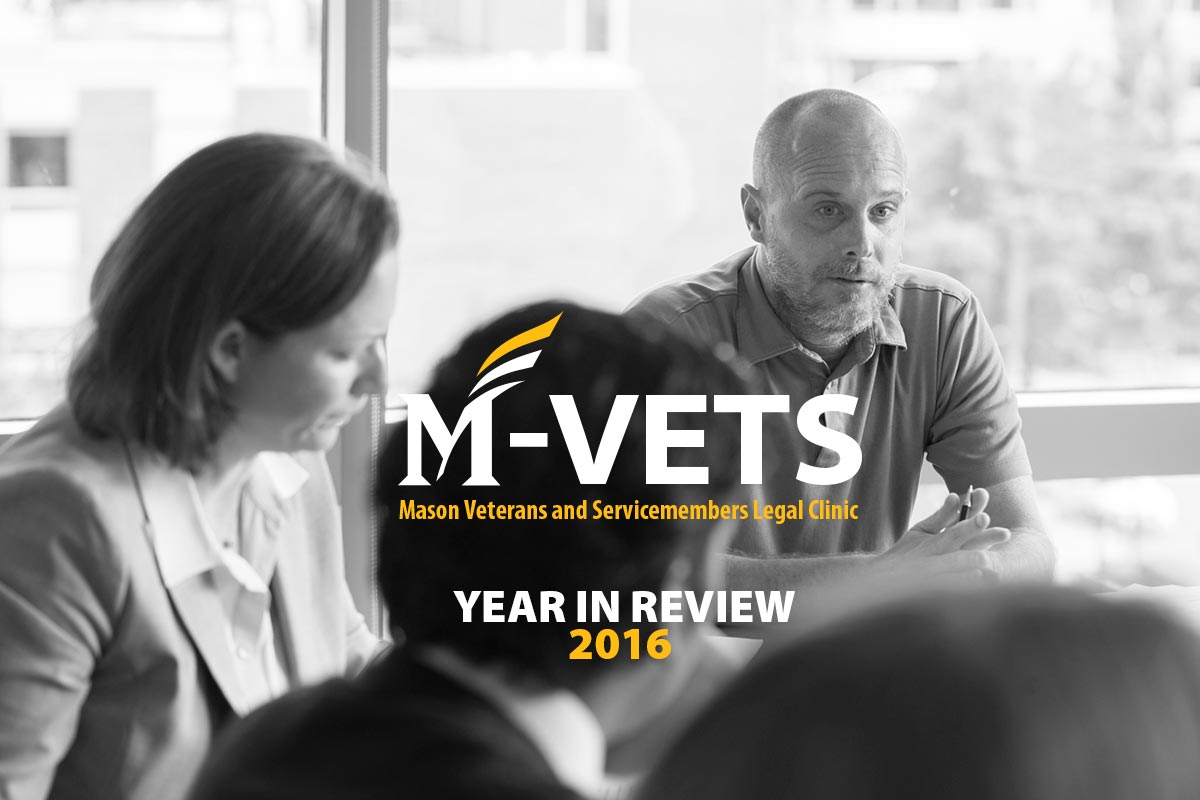M-VETS History
Founded in 2004 to meet the legal needs of deployed U.S. Servicemembers, the Mason Veterans and Servicemembers Legal Clinic (M-VETS) directly aids in the readiness, quality of life, and morale of the members of our military forces and their families.
The Commonwealth of Virginia has nearly 800,000 veterans in its jurisdiction, with nearly one quarter of those veterans residing in Northern Virginia. Northern Virginia is further home to a large number of active duty personnel and their dependents, increasing the need for legal services in this area. The clinic’s unique location as well as its ability to provide civil legal representation where representation from installation legal assistance attorneys is not available makes it a valued resource.
Today, M-VETS represents clients from all five branches of the military and provides the most comprehensive legal representation of any veterans’ clinic in the Commonwealth of Virginia. Services include applications for discharge upgrades; representation before Medical and Physical evaluation boards; appeals of denied Veterans Affairs disability compensation claims; appeals to the Board of Veterans Appeals and the Court of Appeals for Veterans Claims; and representation in the negotiation and litigation of consumer protection, contract, family law, landlord-tenant and expungement cases in the Virginia courts, as well as drafting simple wills and powers of attorney.
M-VETS Mission
The mission of M-VETS is to provide free representation to active-duty members of the armed forces, veterans, and their families while offering law students the opportunity to receive supervised, practical legal experience by advocating for those who serve or have served in our United States Military Forces.
M-VETS Clinic Vision
As the first veterans law school clinical program in the United States, M-VETS served as the model for veterans and military clinics in law schools across the country. M-VETS vision is to be recognized as the most comprehensive and prolific veterans clinical program in the United States and to again serve as the model for veterans and military clinical legal education.
From the Director
Some big changes are taking place! For the M-VETS Legal Clinic, 2016 was a big year with some big changes. To start, this Year in Review will be an annual publication from M-VETS detailing the events of the previous twelve months and the plans for the next.
First, M-VETS will be maximizing development opportunities and increasing its staff in order to grow the program. To this end, M-VETS hired its first full-time managing attorney this past year, Leigh M. Winstead. Ms. Winstead is devoted to supporting civil litigation matters at the M-VETS clinic and overseeing the daily operations of M-VETS.
Second, M-VETS will be increasing its community outreach with strategic partnerships such as the American Legion Post 139 in Arlington, the Virginia Department of Veterans Services and the Center for Psychological Services at George Mason University. These partnerships will enable M-VETS to serve a greater number of veterans and servicemembers while providing Scalia Law students with hands-on legal experience in a variety of substantive legal areas.
Finally, M-VETS’s ultimate goal is to expand veterans’ access to free legal services. In the Fall 2016 semester, M-VETS welcomed its largest class in program history and provided the private market value equivalent of over $250,000 in pro bono legal services. With continued program expansion, M-VETS is anticipating another record-setting year in 2017! A special thanks to student-advisor Matt McIntee and Managing Attorney Leigh M. Winstead for their great work in making this Year in Review possible.
M-VETS Milestones
M-VETS Student-Advisors Participate in National Veterans Law Moot Court Competition
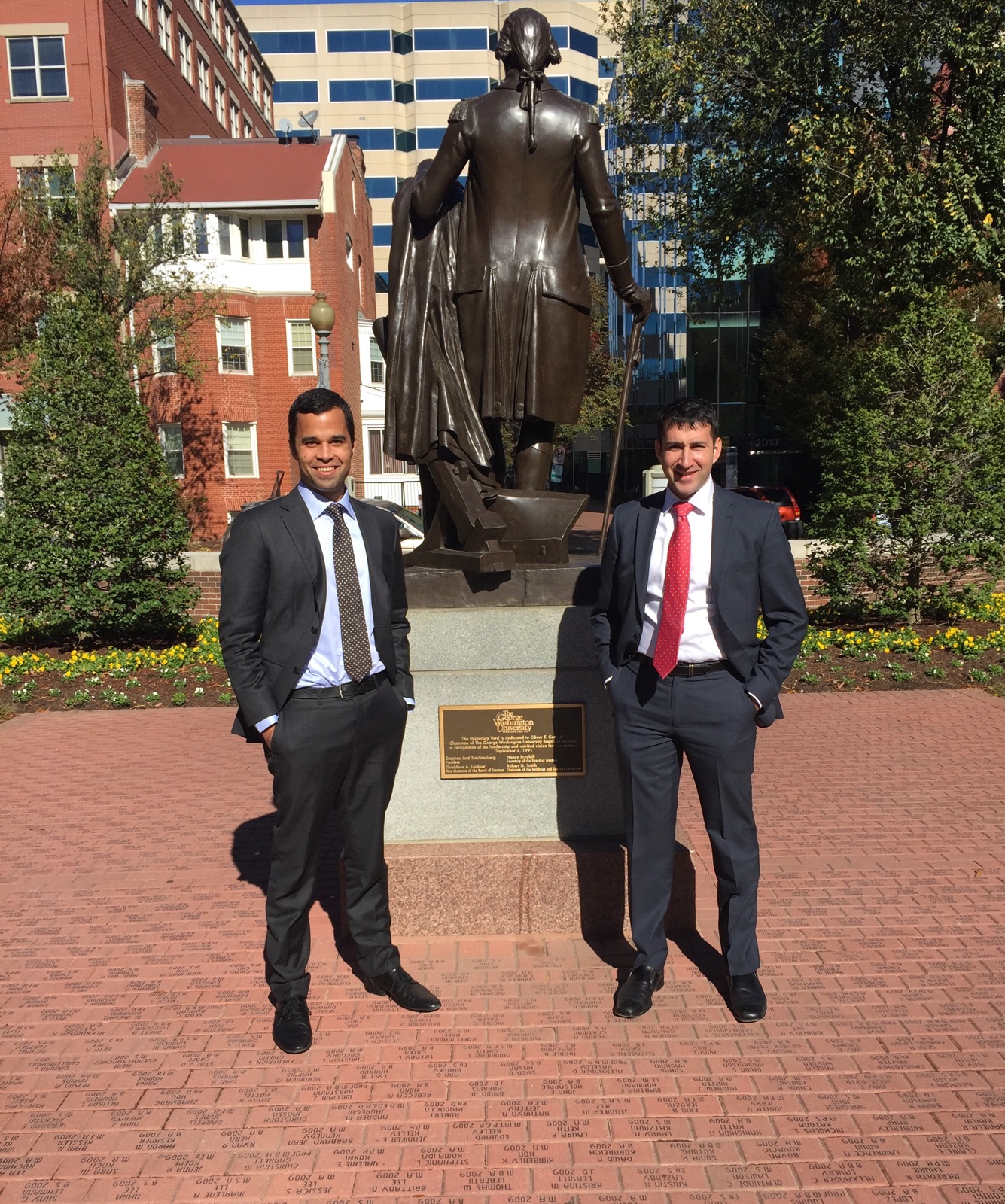
For the first time in program history, two student-advisors with The Antonin Scalia Law School Mason Veterans and Servicemembers Legal Clinic participated in the 2016 National Veterans Law Moot Court Competition at the George Washington University Law School in Washington, D.C. Matthew McIntee and Rodger Nayak, third year law students at Scalia Law School and student-advisors with the M-VETS program, entered the competition in September 2016 and worked for two months to prepare a brief in support of the hypothetical Respondent and prepared to argue both sides of the appeal during oral argument at the competition that took place on November 5-6, 2016.
This year’s case dealt with an appeal before the United States Supreme Court pertaining to the VA’s authority to administer medical marijuana to patients. Specifically, the teams were asked to analyze whether the U.S. Court of Appeals for Veterans Claims has the authority to review the validity of laws and regulations listing marijuana as a Schedule I drug for purposes of the Controlled Substances Act and whether the VA’s failure to administer medical marijuana constitutes “carelessness, negligence, lack of proper skill, error in judgment, or similar instance of fault” for purposes of 38 U.S.C. § 1151.
This year’s competition was one of the largest in history with 24 teams competing from 17 law schools, including M-VETS’s first ever appearance in the competition. Despite an outstanding effort by the M-VETS team, Baylor Law School took home top honors in the competition. Regarding the experience, student-advisor Rodger Nayak stated: “In researching our brief and preparing for oral arguments, Matt and I learned the principles, policies, and history of Veterans benefits law. The U.S. has an administrative agency, federal court, and body of case law devoted solely to veterans’ benefits determinations. Our greater knowledge of this complex area of law, combined with the feedback that the judges at the competition provided us, has helped me and Matt become better advocates for Veterans seeking benefits from the Department of Veterans Affairs.”
Student-advisor Matt McIntee echoed this statement and provided: “The Veteran’s Moot Court Competition at GW Law was a great opportunity to dive headfirst into a unique, but exceptionally important area of the law. It not only afforded students the chance to hone their brief writing and oral argument skills, but it also helped raise awareness about a growing area of the law that needs solid attorneys.”
M-VETS Director, Timothy MacArthur, recognized both student-advisors’ dedication and effort to the brief and oral arguments stating: “Matt and Rodger did a great job during the entirety of this competition. This was the first time Scalia Law School participated in this event and we hope to keep sending student-advisors to this competition in the future. The oral arguments were a very valuable learning experience as the moot court judges were litigators in the area of Veterans Law. This type of competition furthers the goals of inspiring public service in this area of law and provides a practical exercise for experience. Also, M-VETS would like to personally thank Adjunct Professor Brandy Wagstaff who volunteered her time and substantial moot court experience to get Matt and Rodger ready for this competition.”
M-VETS Student-Advisors Staffed to Virginia’s First Veterans Treatment Docket
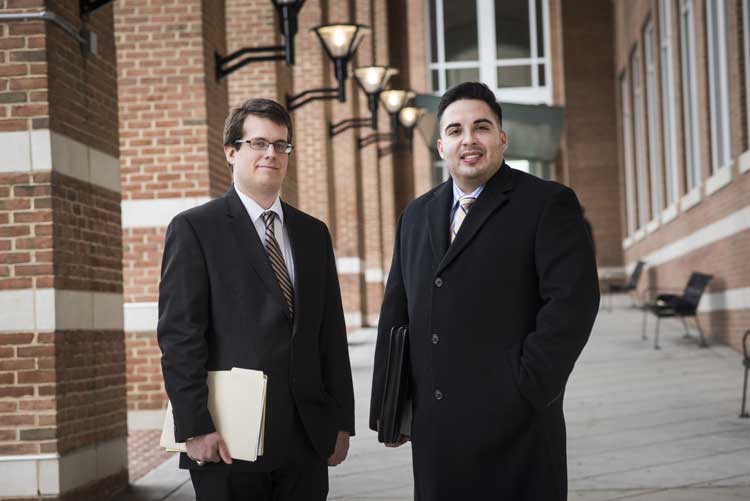
Beginning in the fall of 2016, M-VETS detailed two student-advisors, Jameson Goodell and Fernando Cota-Wertz, to assist with the Fairfax County Veterans Treatment Docket (“VTD”), the first court-supervised comprehensive veterans treatment program in the Commonwealth of Virginia. Both student-advisors made a two-semester, nine-month commitment to the docket. Mr. Cota-Wertz is assigned to the Commonwealth Attorney’s Office assisting prosecutors and the presiding Judge with participant selection and acceptance into the program. Mr. Goodell is assigned to the Fairfax County Public Defenders Office in a role advocating for those seeking to graduate from the very selective and intensive program.
M-VETS was a driving force in the development of the VTD, which held its first formal session in February of 2015. The VTD continues to provide veterans with diagnosed mental health conditions and/or substance abuse issues a comprehensive treatment program supervised by Fairfax County Circuit Court Judge Penney Azcarate. There are over 200 Veterans Treatment Dockets around the United States, the first of which was formed in 2008 in Buffalo, New York. Despite boasting the seventh highest veteran population in the country, Virginia did not have a veterans treatment court until the establishment of the Fairfax County VTD in 2015.
M-VETS Expands its Pro Bono Practice Areas to Include Expungements and Wills
M-VETS scope of pro bono services has expanded tremendously since its inception in 2004. The clinic initially began providing pro bono legal representation in civil litigation matters in Northern Virginia courts, including landlord-tenant matters, contract disputes, and family law cases. The clinic later increased its footprint in the military community by expanding its practice area to include military law and VA matters, providing valuable representation to Veterans and their dependents which directly impacts their access to VA benefits and services.
In 2016, M-VETS took initiatives to expand its practice areas to include expungements in northern Virginia courts and drafting simple wills. M-VETS expanded in response to a large number of requests for legal services in these particular areas. With the addition of these new services, M-VETS will be able to serve a greater number of veterans and servicemembers.
Faculty and Staff
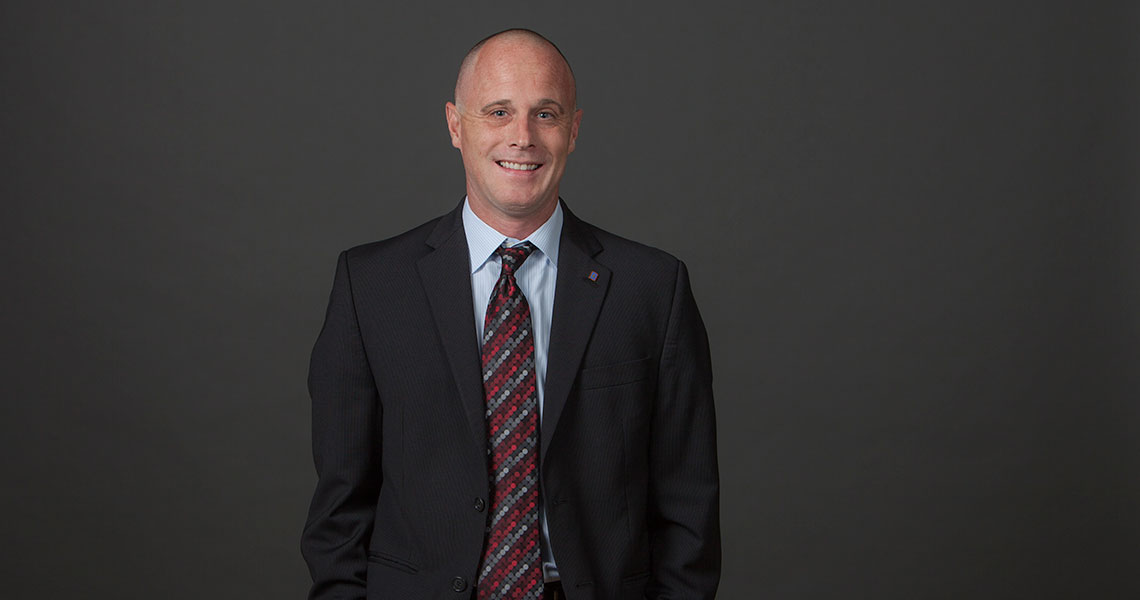
Timothy M. MacArthur, Clinical Professor and Director of Mason Veterans and Servicemembers Legal Clinic (M-VETS). B.S., Madonna University; J.D., Michigan State University/Detroit College of Law
Timothy M. MacArthur is a Clinical Professor and Director of the Mason Veterans and Servicemembers Legal Clinic at the Antonin Scalia Law School at George Mason University. Professor MacArthur brings to the position over 14 years of military experience with the United States Army. MacArthur began his legal career as an active duty Judge Advocate in the United States Army Judge Advocate General’s Corps where he served as a Trial Defense Counsel, Trial Counsel/Special Assistant United States Attorney and Administrative and Legal Assistance Attorney.
Following his release from active duty, Tim practiced as a Principal Assistant Public Defender in Lake County, Illinois, where he litigated difficult felony cases and was a Public Defender representative to the Veterans Treatment and Assistance Court. Simultaneously, Professor MacArthur served in various legal positions in the U.S. Army Reserve, to include, as a Brigade Judge Advocate, Ethics Advisor and Team Chief.
Tim’s JAG career has taken him to many places, but perhaps the highlight is 2011 when he was selected to be the Deputy Staff Judge Advocate for Joint Task Force Guantanamo at the U.S. Naval Station in Guantanamo Bay, Cuba. As part of JTF-GTMO, he served as Staff Judge Advocate in the absence of the SJA, worked on JTF-GTMO policies and procedures, oversaw legal aspects of detention operations, served as a SJA liaison to the Joint Detention Group entering the camps and resolving detainee requests, and supervised the daily operations of the JTF-OSJA.
Immediately prior to joining the faculty of George Mason, Professor MacArthur completed a 2-year mobilization in the U.S Army Office of Soldiers’ Counsel as a Physical and Medical Evaluation Board Counsel representing Soldiers before formal Physical and Medical Evaluation Boards. Professor MacArthur received his Juris Doctorate from Michigan State University/Detroit College of Law in 2001. He received a Bachelor of Science degree in Psychology from Madonna University in 1998. Professor MacArthur is a member of the Illinois Bar.
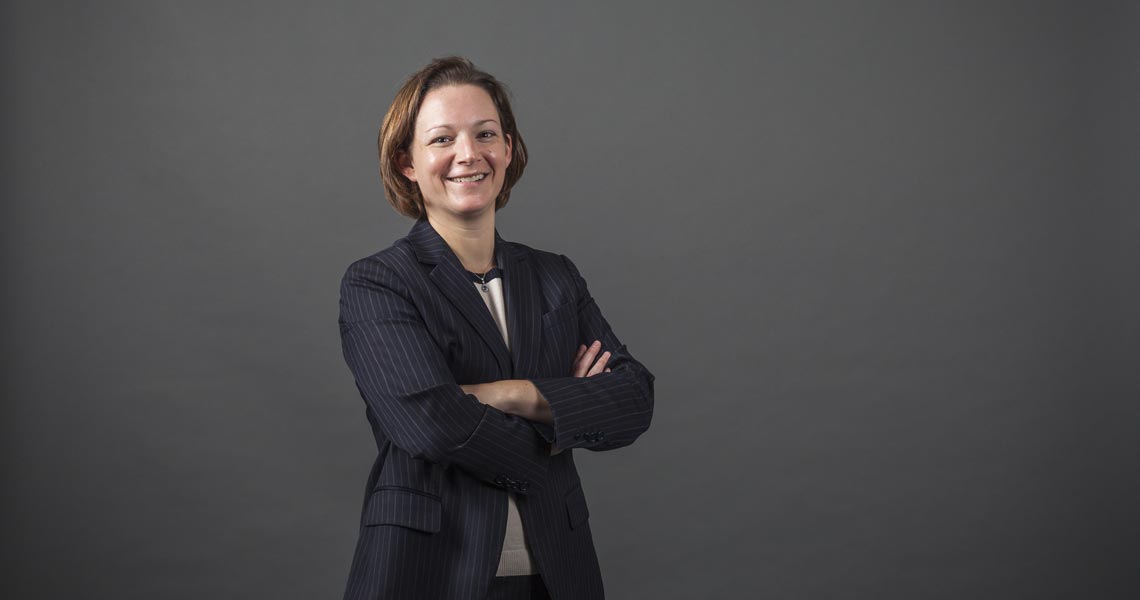
Leigh Murray Winstead, Esq., Managing Attorney, Mason Veterans and Servicemembers Legal Clinic (M-VETS). B.A., The Pennsylvania State University; J.D., American University, Washington College of Law
Leigh Winstead is the Managing Attorney for the Mason Veterans and Servicemembers Legal Clinic where she oversees all civil litigation matters in the clinic and manages the daily operations of the clinic. Prior to joining George Mason, Ms. Winstead was an associate at Odin, Feldman & Pittleman, P.C. practicing in the civil litigation and intellectual property practice groups. Ms. Winstead’s diverse practice encompassed, among other things, commercial contract disputes and intellectual property litigation in state and federal court. While in private practice, Ms. Winstead was named among Virginia’s Legal Elite by Virginia Business magazine for Legal Services/Pro Bono in 2013 and 2015.
Ms. Winstead has authored and co-authored several published articles including, Sirius Mistake: The FCC’s Failure to Stop a Merger to Monopoly in Satellite Radio, 59 AM. U. L. REV. 83 (2009) and Putting the Genie Back in the Bottle: Leveraging Private Enforcement to Improve Internet Privacy, 37 WILLIAM MITCH. L. REV. 1671 (2011).
Ms. Winstead earned her B.A. from The Pennsylvania State University and her J.D. from American University, Washington College of Law where she was a member of the American University Law Review. Ms. Winstead is a member of the Virginia Bar.
National Security Institute

The newly launched National Security Institute (NSI) at the Antonin Scalia Law School at George Mason University is dedicated to finding practical answers to national security law and policy questions. M-VETS Professors Timothy M. MacArthur and Leigh M. Winstead are active members of the NSI. For more program info, visit the website at http://nationalsecurity.gmu.edu/
Community Ties
M-VETS and Virginia Department of Veterans Services Team Up on BVA Appeals

M-VETS is proud to announce a newly formed partnership with the Virginia Department of Veterans Services (VDVS) to assist VDVS with cases before the Board of Veterans Appeals (BVA). The partnership will provide a significant amount of meaningful work to student-advisors who will have the opportunity to argue appeals before the BVA with the oversight of VDVS attorneys.
In an effort to provide clients with affordable access to psychological evaluation services, M-VETS has teamed up with the Center for Psychological Services at George Mason University (CPS) to facilitate a referral resource for M-VETS’ clients to receive psychological services necessary to support their benefits cases. CPS provides evidence-based assessment and treatment services primarily conducted by GMU graduate students under the supervision of qualified, licensed professionals who are affiliated with the University.
Patriot Thursdays with American Legion Post 139
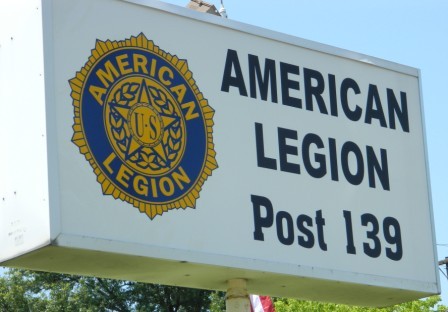
Patriot Thursdays is a partnership between the Mason Veterans and Servicemembers Legal Clinic and American Legion Post 139 located in Arlington, Virginia. This partnership will be housed at American Legion Post 139’s location at 3445 Washington Blvd, Arlington, Virginia 22201. M-VETS is able to provide much needed legal services to members of the military, their dependents and veterans. Due to the proximity of Post 139 to the Antonin Scalia Law School, it was an ideal partnership to form. Providing direct access to legal resources to the large veteran population in our geographic area is a priority for M-VETS. M-VETS provides legal representation concerning VA Disability/Benefit Appeals, Discharge Review Boards, Boards for Correction of Military Records, Medical/Physical Evaluation Boards, and military legal issues.
A unique service offered by the M-VETS legal clinic is the ability to provide representation to clients in Northern Virginia civil courts in certain cases. M-VETS partnership with American Legion Post 139 will provide the opportunity for veterans and Servicemembers to speak one-on-one with attorneys and student-advisors in an informal setting regarding a wide variety of civil matters, such as landlord/tenant issues, contract disputes, or guidance in the divorce or separation process. Many times clients simply need legal advice rather than representation, but general legal consultations can cost hundreds of dollars. This program will increase veterans’ access to legal services in a comfortable, confidential forum.
M-VETS will conduct office hours at Post 139 by appointment on Thursdays from 1300 until 1600 in order to provide legal services in a familiar and friendly environment. Post 139 will provide confidential workspace, which will allow for veterans to have their legal matters heard and evaluated by student advisors in the M-VETS program with supervision by an M-VETS attorney. More information can be obtained and appointments can be made for this program by visiting https://mvets.law.gmu.edu/patriotthursdays/ by email at [email protected] and phone (703) 993-8214. American Legion Post 139 can be reached at [email protected] or (703) 524-1396.
M-VETS Community Outreach at a Celebration for Veterans at VFW Post 3103

The Antonin Scalia Law School Mason Veterans and Servicemembers Legal Clinic attended an outreach event at a “Celebration for Veterans” at the Veterans of Foreign Wars Post 3103 in Fredericksburg, Virginia, on 15 OCT 16. Student-advisors Anne Kidd and C.J. Nee represented Scalia Law School and the M-VETS program by providing information to the Veteran attendees and their family members in an effort to increase awareness of the pro bono legal services M-VETS is able to provide to these Veterans and their family members. M-VETS Director, Timothy M. MacArthur, believes outreach to organizations like the VFW is “essential in providing visibility concerning our program, services and school to this population.” MacArthur commented: “This type of outreach is also valuable to the M-VETS student-advisors as they are able to gain a greater understanding of veteran and military culture through first-hand experience.”
The event was a “Celebration for Veterans” and was attended by local businesses and State and Federal organizations. Local businesses provided access to on-site massage therapists, cosmetic services and a free lunch provided by Olive Garden. M-VETS was joined by the Department of Veterans Affairs mobile Vet Center which provided health screenings to veterans in attendance and Virginia Department of Veterans Services who provided literature regarding benefits for veterans and their family members. M-VETS Managing Attorney, Leigh M. Winstead, was in attendance on Saturday. “We are very grateful to the organizers of the event and the Fredericksburg VFW for hosting a great day of appreciation for our Veterans,” Winstead said. “It was a great opportunity to not only offer our assistance to local Veterans but simply be able to thank so many Veterans in-person for their service.”
M-VETS will continue to conduct outreach and provide information regarding the Scalia Law School to active-duty members of the armed forces, their families, and veterans. Please keep visiting our webpage to keep updated on future events
Student Standouts
Amicus Curiae brief filed in the U.S. Supreme Court on behalf of M-VETS and veterans seeking redress in medical malpractice claims against the Department of Veterans Affairs.
In September 2016, an Amicus Curiae brief was filed on behalf of M-VETS together with the Baylor Law School Veterans’ Assistance Clinic (“Baylor Clinic”) in an effort to increase available avenues of justice for veterans seeking redress in medical malpractice claims against the Department of Veterans Affairs (“VA”).
The brief was filed on behalf of M-VETS and the Baylor Clinic in support of the petitioner in Milbauer v. United States of America, which was on petition for writ of certiorari before the United States Supreme Court. The case would have resolved a split among the United States Circuit Courts as to whether the Veterans’ Judicial Review Act (“VJRA”) bars federal district courts from hearing VA medical negligence suits arising under the Federal Tort Claims Act (“FTCA”).
The Petitioner, Richard Milbauer, brought suit against the VA after the failure of VA physicians to recommend and perform alternative diagnostic procedures rendered a treatable shoulder injury permanent. The Eleventh Circuit held that the federal courts lacked jurisdiction over Milbauer’s claim based on a broad reading of the VJRA’s prohibition on judicial review of any VA decision affecting “the provision of benefits” to veterans. M-VETS student-advisor Michael West spearheaded this effort for M-VETS along with Managing Attorney Leigh Winstead.
“This issue is extremely important to our military veterans seeking redress in cases of medical negligence against the VA,” Leigh Winstead, M-VETS Managing Attorney said. “The split among the Circuits creates uncertainty for veterans who have been harmed by the decisions of VA medical staff and desire to pursue damages under the FTCA,” Winstead said. “It is imperative that the Supreme Court clarify the confines of the VJRA’s jurisdictional bar to ensure that appropriate legal remedies are available to our veterans.”
M-VETS and the Baylor Clinic were represented by the international law firm of Reed Smith LLP in filing the brief. In January 2017, the Supreme Court denied Milbauer’s petition for certiorari.
Key Policy Issues for Veterans in 2017 by Student-Advisor Anne Kidd
On December 23, 2016, President Obama signed into law the National Defense Authorization Act (NDAA) for Fiscal Year (FY) 2017 (“FY17 NDAA”). The NDAA is an annual occurrence and is one-half of the federal budgetary process for the Department of Defense.
The following is just a sampling of the provisions in the FY17 NDAA:
Military Pay. The FY17 NDAA authorized an across-the-board pay raise of 2.1% for service members, effective January 1, 2017. However, it should be noted that the FY17 NDAA does not apply to Basic Housing Allowance rates.
TRICARE Reform. The FY17 NDAA permits DOD to establish TRICARE Select, which will be a self-managed, preferred-provider network to allow freedom of choice for eligible beneficiaries. Additionally, fees will increase for TRICARE Prime retirees and family members through increased annual enrollment fees and additional cost sharing fees (e.g., copays).
Healthcare Reform. The FY17 NDAA provides for expansion in access to urgent care in military and private facilities. Also, the FY17 NDAA requires Military Treatment Facilities to increase primary care services through expanded hours of operation.
Family Leave. Primary caregivers in the military services will be permitted to take 12 weeks of leave following the birth of a child, including up to six weeks of medical convalescent leave and secondary caregivers in the military services may take up to 21 days of leave. Additionally, the FY17 NDAA permits primary caregivers in the military to take six weeks of leave following adoption of a child and secondary caregivers will be able to take up to 21 days of leave.
UCMJ Reform. The FY17 NDAA authorizes an overhaul of the UCMJ, including significant procedural reforms at all levels of the litigation process from pretrial through appellate hearings, expansion and/or introduction of defined offenses, and revisions to punitive measures. The goal of procedural changes is to improve transparency in the system.
Recruiting and Retention Incentives. The FY17 NDAA includes new or revised recruiting and retention incentives for certain critical positions in the military.
Civilian Pay. President Obama extended the 2.1% pay raise for military service members discussed above to all civilian employees in the federal government (not only those in the DOD). Additionally, the Office of Personnel Management adjusted the Cost of Living Adjustment (COLA) for various localities in 2017.
Administrative Leave Restrictions. The FY17 NDAA restricts the amount of time all civilian personnel (not only those in the DOD) may be placed on paid administrative leave.
How – and why – a law school veterans clinic works

The Antonin Scalia Law School Mason Veterans and Servicemembers Legal Clinic contributed to the ABA Law Student Division Before the Bar blog. The Before the Bar blog connects students to information on careers and topics within the legal field and spotlights projects that are going on at law schools. One of these areas, legal services for Veterans, is the special focus for the ABA Pro Bono week taking place from 23-29 OCT 2016. At the annual ABA meeting in August, ABA President Linda Klein launched a Veterans Legal Services Initiative focused on providing a major effort to mobilize lawyers on behalf of enhanced legal services for the nation’s veterans.
M-VETS student-advisors Rebecca Eubank and Michael West answered the call of President Klein through their enrollment in M-VETS and represented Scalia Law School and the M-VETS program by contributing an article to the Before the Bar blog detailing the M-VETS program, their experience as student-advisors in the M-VETS clinic and working directly with veterans, servicemembers and their dependents. Ms. Eubank stated: “The best part of taking part in a clinic is the practical experience you gain and the opportunity to work directly with veterans, servicemembers and their dependents. A clinic experience reflects life in a real law practice where you may or may not know much about a specific area of law before you’re assigned to a case. In a class, you might sit there for a semester pouring through property law and trying to commit as much of it as you can to memory. After assisting a veteran in one landlord-tenant matter, you’ll probably remember the steps required for a landlord to evict a tenant much better when the bar exam rolls around.”
Mr. West echoed this statement and added: “M-VETS gives us the opportunity to develop our law practice skills by providing us with a hands-on educational experience and the opportunity to gain real-world legal experience as if we worked in a real law firm. The director and managing attorney give us leeway in how we want to operate our clinic. The experience has been great thus far. The learning curve was steep at first, but once we were over the hump, it has become an extremely satisfying experience.”
The article highlights the fact that M-VETS is dedicated to the mission of providing active-duty members of the armed forces, their families and veterans with free legal representation while providing law students with substantive work with a diverse range of subject matters. As the first veterans law school clinical program in the United States, M-VETS has served as the model for veterans and military clinics in law schools across the country. Managing Attorney Leigh M. Winstead praised the ABA’s decision to highlight Veterans clinics and other pro bono veterans initiatives in celebration of Pro Bono Week. “Many of these clinics and initiatives began as a result of student-organized efforts to provide legal assistance to veterans, servicemembers and their families in a very nuanced and complex area of law unfamiliar to many practitioners and law students,” Winstead said. “Their hard work and incredible results should be highlighted and praised. It is important to spotlight the work being done in these clinics and organizations so we can educate the greater legal community about the continuing need for assistance in this area.”
The “How – and why – a law school veterans clinic works” written by Ms. Eubank and Mr. West can be read at http://abaforlawstudents.com/2016/10/25/how-and-why-a-law-school-veterans-clinic-works/
